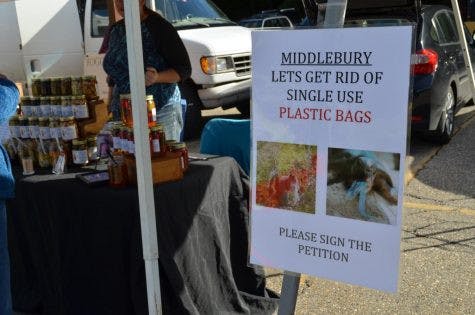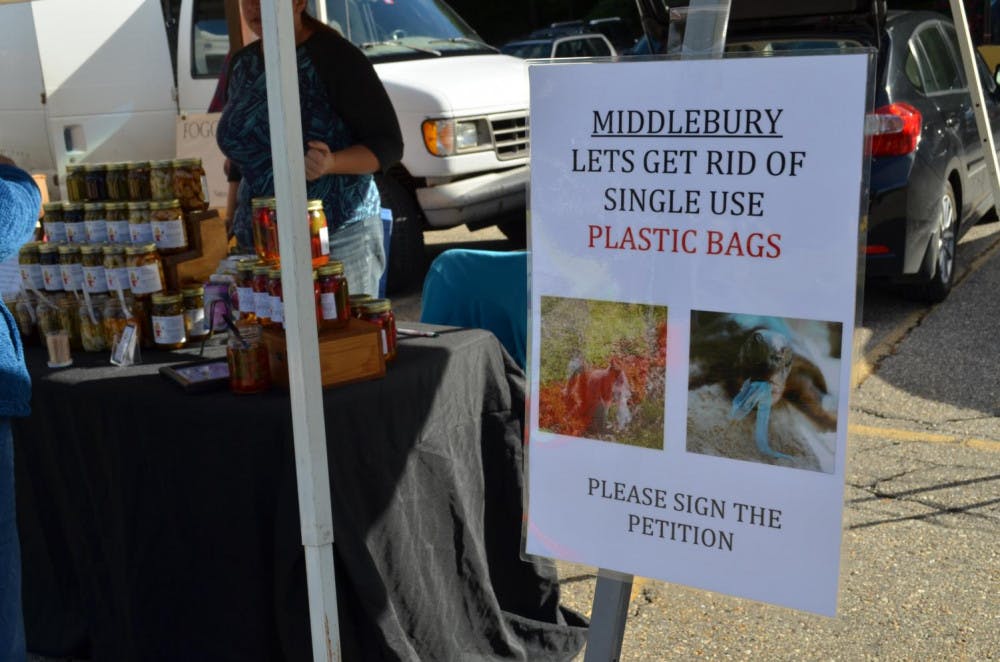MIDDLEBURY — Middlebury resident Amy McAninch hopes town legislature will soon pass a bill that would prohibit local retailers from providing customers with single-use plastic bags at checkout. With the help of roughly a dozen volunteers, McAninch has successfully completed a town petition as of September, bringing her proposal one step closer to being voted on in Middlebury’s annual town meeting in March of next year.
The initiative began last spring, when McAninch realized other New England towns were passing similar bans on plastic products, specifically plastic grocery bags. She described the somewhat epiphanic moment she experienced after reading a letter to the editor in a local paper on the subject.
“What’s the matter with Vermont? We should be doing this,” McAninch said.
Soon after McAninch started organizing the petition, Amelia Miller, now a junior at Middlebury College studying environmental science, stumbled into McAninch’s project through a research assignment in her Environmental Policy class.
She said the initiative was right up her alley. “My parents hate shopping with me, because I refuse to use plastic bags,” Miller said. “I will carry things out with my hands.”
Miller was able to connect with McAninch through her professor, and things just felt right after that, Miller said. The two began working in tandem to formulate a town petition and spread word of their efforts. Their specific request? To halt retailers in town from providing bags with a thickness of less than four mils, or .0004 inches. Typical single-use plastic bags are one to two mils thick.
“Four mils is the difference between single-use plastic and reusable bags,” Miller said. Miller and McAninch hope that with a thickness minimum at four mils, any plastic bags that retailers can supply will be too expensive to be single-use, and will incentivize customers to use their own reusable bags. However, the ruling would not inhibit retailers from providing plastic packaging as part of a product, nor the sale of plastic bags and other plastic products. Although the ban would only knock out a specific moment in which one type of plastic product is used, McAninch and Miller believe a plastic ban of any magnitude could have larger implications.

The petition to ban single-use plastic bags in the town of Middlebury featured at the Middlebury Farmers’ Market.
“The goal is not to solve the plastic problem. Everything is plastic. We live in a plastic world,” Miller said. “The ban will create a conversation about how plastic is used in all aspects of our lives.”
Maggie Eaton, a volunteer for the initiative, agreed that this project is about “protecting downstream damage that these bags do.” She decided to volunteer her time for the proposal because of how much she sees the effects of plastic-product waste daily, even in Vermont.
For McAninch, a ban of this scope would show our plastic-product dependency. “There’s no doubt it’s convenient. It’s too convenient,” she said. “It takes effort to wean yourself off.”
Since their initial introduction last spring, McAninch and Miller have collected signatures from over 5 percent of town voters, the amount needed in order to receive a spot on the town ballot. To collect signatures, McAninch and Miller’s strategy involves standing outside the Middlebury Foods Co-op on Washington Street, attending public town events and holding a booth at the Middlebury Farmers’ Market on Saturday mornings.
McAninch said the reception has been quite positive, and estimated that 85-90 percent of all Middlebury residents she asked have signed the petition. She guessed that she currently has over 300 signatures. Eaton said the next step is contacting merchants and letting them know there is a possibility of a plastic ban in an act of “preparation.”
Middlebury is now added to the list of Vermont towns where residents have or are attempting to ban single-use plastic bags from retail locations. This list includes Brattleboro, the first Vermont town to enforce a similar ban on plastic bags, which went into effect this July. McAninch hopes that with more towns banning these bags, it will put an impetus on Montpelier to pass legislation. Pertinent bills addressing plastic usage have been floating around the Vermont State House for a few years now.
As for herself, McAninch will keep collecting signatures until her petition is filed, and is looking toward March 2019, when the proposal has a chance to be voted on by residents.
“I just feel outraged — we’re just drowning in this,” she said. “It seems to me there just has to be some quantum leap in our conscience about what we’re doing to the Earth.”
Ban the Bag? Middlebury Considers Town-Wide Ban on Single-Use Plastic Bags

Photo by: Benjy Renton
Comments



